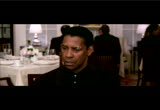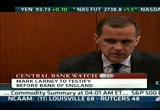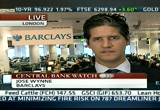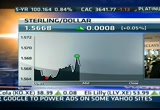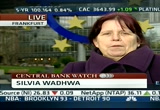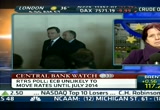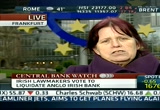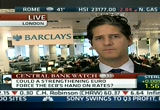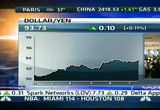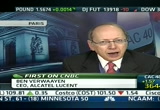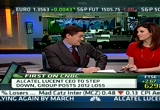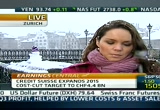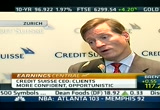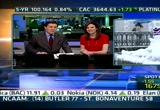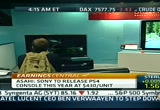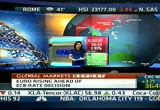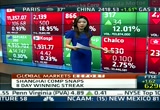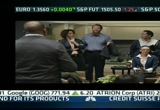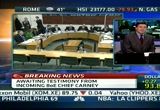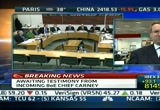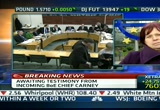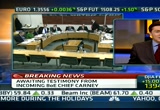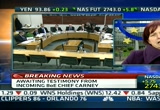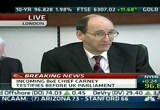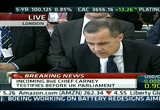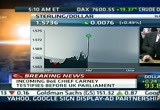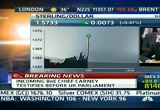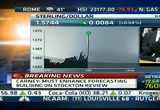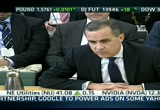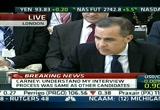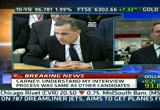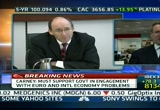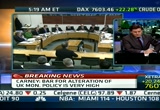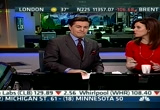tv Worldwide Exchange CNBC February 7, 2013 4:00am-6:00am EST
4:01 am
4:02 am
the next bank of england governor mark carney faces lawmaker easy here in the uk with investigators keen to get his read on the outlook of the economy. new money below expectations, although the stock is trading higher. >> and the falling yen helping to keep sony in the game. the playstationmaker plans to stay in the game. >> you're watching "worldwide exchange," bringing you business news from around the globe. >> all right. welcome to today's program. we've got extended programming today because of the bank of england and ecb rates. it's not the "worldwide exchange" program -- are you involved, still? you've got a long day ahead. >> if you like your business news -- >> if you like your central bank meeting, which come on. >> and here is the thing. i was talking about it earlier in the week. is it just questions dense that
4:03 am
mark carney is giving testimony while the bank of england is sitting down to decide upon the rate policy? that seems weird to me. >> but even if it happens on the state or what have you, just understates what they're paying to mark carney and basically ignoring the group he's about to take over. they're a busy group. there's apparently only one day this whole month they could possibly have him in. >> anyway, as we were talking about -- >> that's right. mark carney will be grilled by the treasury committee. that will start in about 45 minutes time and we will be carrying the feed. markets will be watching closely for carney's stance on his new role in supervising the financial sector. we'll bring you that live. it's been about 45 minutes time for mow. >> and before that, we have got
4:04 am
the latest manufacturing figures, industrial production, as well. weak q4, looking for signs that things are getting better. >> we already though for spain they were a little bit better, hab, but still down sharply from a year earlier. >> so the big question is how will the pound trade through this carney testimony? joining us is sophie wynn. how much expectation is built into the pound ahead of this? the expectation is he's going to come in and be fairly dovish. it's a risk that he isn't and, therefore, the pound strengthens. >> we think that the market may be disappointed with the announcement. we don't think we are going to hear anything radical on this statement by the upcoming governor. >> why? >> well, basically, i think, you know, the expectations are that the ecb is going to go for a nominal gdp target at least for
4:05 am
some time. and we think the risks are too much for them to -- for the government to pursue these sort of bodies. he will entertain -- before going for this. >> the bank of england will be under some pressure. currencies don't act in a vacuum. so as we see other potential moves to weakening currencies around the globe, we're at 1.5668. where might this pair be headed, then, if you're not expecting carney to come in and immediately talk or wind up having effective currency lower? >> we think the guarantee should weaken readily. we don't think the currency will be, you know, underperforming going forward. it should be played in between, depending on what sort of statement we hear trt upcoming central bank governor we will see where it's going. but so far, we don't think that this meeting with the treasury will be something to worry about
4:06 am
for the move on the pound. >> okay. jose, stay there because we want to talk ecb, as well, decision time, of course, in frankfurt. we're not expecting a change in policy, but we are looking for any explicit reference to the exchange rate or future moves that might weaken the euro. sylvia is in frankfurt for us. sylvia, when we're in davos, the comments from the ecb, mr. draghi, we don't care about the ecb change or comfortable with it, to paraphrase it. i wonder whether the speech this week from mr. hollande has any impact whatsoever. >> nope. we've already heard this from the ecb many, many, many times before over the past more than a decade. there is no exchange rate target. we haven't got an exchange-rate-oriented policy. the ecb doesn't in its comments care about the exchange rate as long as there are no disorderly market conditions.
4:07 am
that's when they start getting worried, when the pendulum swings to high, when it gets erratic, when there's panic in the markets. like we had panic in the markets in the last few years. that's when the alarm bells at the ecb go off. not when there's a slow or gradual move. that's what the central bank governor earlier said this week. and i daresay something along those lines is what mario draghi is going to say. he's going to answer the question, we've had enough questions of that feeled both for trichet and draghi where they simply say we don't comment on exchange rate, next question, please. >> sylvia, it's not just macro policy that policymakers will be debating in the meeting today. we have this issue with the angelo irish, the bad bank in ireland where lawmakers have
4:08 am
concluded that and wind down with it. i guess now what has to happen is this emergency, debt repayment deal we're potentially going to hear about today. do you have any sense about the deal's timing? are we going to hear about this in the press conference, perhaps? and what's at stake here? >> well, what we've heard before the decision of lawmakers but overnight last night was that a decision would not be forthcoming at today's council meeting. you know that the ecb meets every two weeks, but only every four weeks as a press conference. my guess is they want to have a closer look at that and we're either going to hear about it next time around or in between these meetings. but probably not today. i think today we're going to stick with the strict business on hand and that's monetary policy and might be talking about the lcr repayment and what that means for monetary policy and for the ecb's verdict on what the banking system looks like at the moment, but that's
4:09 am
about it. >> sylvia, thanks so much for clearing that up. >> let's bring you back in here. look, we were down -- well, we got to the euro/dollar, 1.3450 at the beginning of the week. we've been up, of course, towards 1.38. what is the line now for euro/dollar? >> well, actually, we think it's going up. there's quite a bit of momentum. you have major central banks in the world pumping money. we may see what happens here in the uk, but also, you see japan, the fed pumping at the base of 85 million a month. the ecb has maintained a more hawkish stance. even though we believe that it is fairly priced, it's about 3% expensive according to our measures. we may see momentum going into the euro in spite of the fact about this speculation about currency wars. >> yeah. i mean, what's the risk going into the g-20 meeting later in the month? >> i think the g-20 group has lost power, really.
4:10 am
if you look at the members, quite a bit of them have already gone into monetary policy, there's little they can say about this. i don't think this is going to go into major war. >> meanwhile, the yen continues. we just want to get a quick view on that target. >> we continue to see, continue to see that the yen will weaken going forward. we would see these numbers highly uncertain. what we are looking for is early warnings that the yen may be reaching a bottom and for that we would need to see some indications that inflation expectation has been building and nothing so far has been priced. or that there is some surprise which may show up for a couple of years, actually. we are up for quite a bit of rise in the yen. >> thank you, jose wynne, ahead of fx research at barclay's.
4:11 am
shares are rising this morning with a lot of almost 1.4 billion euros following a drop in sales and impairment charge. the decision to step down is the best for the future of alcatel-lucent is what he said. >> it is execution, execution, execution. and maybe that is not the natural strengths that i have. so you have to be honest with yourself, to the company and to the environment. and after five years, it's better for somebody else to take the helm of the company. you have to have a thoroughly debate first with yourself and then with the board and make a decision. i took the decision -- it's hard, you know? it is emotional. it feels like painful, but at the same time, it's better for
4:12 am
the company and, therefore, that's what you have to do. >> it's interesting to look at shares of alcatel lucent today responding sharply to the upside. they've been hammered. so some context here. 7.6% with the move. alcatel lucent and bankia. so that's the kind of trading session we're having. >> it's quite interesting to hear from a man who is so honest, to come out and say, you know, it's execution, execution, execution -- >> and i'm not the guy for it. >> and that's not necessarily my strength. the candor, i think, is appreciated on that. it's very rare you hear ceos with that amount of honesty. >> outgoing, too. credit suisse shares moving higher after the bank reported weaker than expected numbers from the fourth quarter. the swiss banking giant said it would expand to 4.4 billion
4:13 am
swiss francs up in a previously announced $4 billion franc target. carolin, investors are pushing shares higher today. >> absolutely. shares have been on a volatile ride this morning. shares were poised to open lower, then they were lower, then they were flat and now they're up. at this point, investors are unsure what the numbers actually mean. let me walking through the details. credit suisse did raise the cot cutting target by 4 million swiss francs. when i talked to the ceo this morning, he said he couldn't rule out further job cuts. in terms of the positive take aways, wealth management showing very strong margin, much better than those at cross town rival ubs. also, the company has made further improvements in terms of the capital levels. now at 9.4%. you can't deny the fact that the
4:14 am
investment banking unit was a bit of a disappointment, specifically fixed income revenues the.they were down 38% quarter on quarter. when i spoke to the ceo of credit suisse, he was more optimistic about what the first quarter and the rest of the year would bring. >> obviously, there is more confidence right now. i think people are being a bit more opportunistic in terms of both from a corporate point of view and from our private clients. but, you know, as always, as we've seen in previous years, that can be fragile. we'll have to see how the year progresses. certainly now the markets have a very positive approach and our clients mostly are feeling, i think, more positive about the markets. but, again, you never know what macro events might intervene to shake that confidence. so we'll have to wait and see. >> so what are the biggest risks here to client activity? >> well, i think it is some of the broader issues that would happen, some of the old issues, whether it's eurozone issues that could reappear, issues in the u.s. on the fiscal front.
4:15 am
obviously, growth around the world. i think we're all pretty constructive on those issues, but i'm sure there will be uppes and downs every year as there are this year. >> and in an hour tr now, we're going to talk to one banking analyst who says that the investment banks will continue to be more volatile than those at ubs because ubs has made a bigger cut. we'll speak to him in one hour's time. for now, i'm going to go back into the warm where it's not snowing as hard. meanwhile, my cameraman has built something very nice, a very nice snowman. he's even got a hat. >> we noticed that straightaway. >> and so did michael houston. carolin, whose hat is that, by the way? >> it's a hat, it's a snow hat from davos, as far as i know. it's a davos hat. >> a agageneric davos hat.
4:16 am
next time we come back, i want some eyes and a nose. if we can do that, that would be very good. you've got an hour. thanks, carolin, thanks, kurt. >> now, the falling yen is helping to keep sony on its profit path. the home electronicsmaker is sticking by its outlook as the weaker currency helped its bottom line. sony turned a profit in the third quarter. although it did fall short of analyst targets. sony will be releasing a playstation four later this year. today, sony trimmed its full year sales target for tv, compacts and gaming devices. it expects a lower yen to make up about $180 million in savings. sony's game plan for 2013, is it viable? later we'll hear from top analyst micola gohkho in singapore. meanwhile, we're an hour and
4:17 am
15 minutes into trade in europe. pretty cautious ahead of what's going on with policymakers. five to five, advancers to decliners on the stoxx europe 600. ftse 100, absolutely up five points. the cac 40 is fairly flat, as well. key focus, the debt market today in europe will be the spanish auction. up 4.5 billion up three issues. what's interesting here, the ten-year spanish yield, 5.47%. kind of the levels that we reached on monday when spikes spiked higher. on the twos and fives yields today are higher than where we were when we had these last auctions in january. had 2.47% was where we're trading in january. around 3.77 is where we're trading on the five-year when we had an auction in mid january. right now, 4.18%.
4:18 am
so we are about 30, 40 basis points higher. that's where we should specific potentially those auctions to go, as well. we'll look for that. on the currency markets, euro slshl dollar, 1.356. 1.3459 is the low that we hit tuesday morning. dollar/yen, 93.77. aussie/dollar, 1.03. sterling/dollar, 1.5673. on a 24-hour basis, we haven't moved an awful lot right now on these currency rates.let's find out what's happening in asia. meanwhile, li sixuan joins us for the first time today. hi, sixuan. >> hi. thank you, ross. the nikkei retreated from the four-year high ending down nearly 1%. despite strong machinery order status, really, the domestic
4:19 am
earnings cues weighing on the japanese market. nickon fell after operating profits and forecasts. yamaha lost nearly 15%. but it's celebrating ahead of mazda motor after raising its full year guidance. the shanghai composite paired back early losses, but still snapped its eight-day winning streaks. banks rallied despite an injection earlier this week. chalco lost nearly 3%. this will be removed from the hang seng index while lenovo will be added to the index in march. gained about 5% today and had already gained 40% during the past 12 months on strong
4:20 am
business momentum. elsewhere, the kospi finished weaker for the fifth straight session to end at a ten-week low, but australian shares gained 0.3% helped by gains in ba banks, miners and telco. come up on today's program, we're going to be in paris after break to hear from the ceo of synofi. >> and the government warnings the an slowdown might be worse than expected. also, daimler is running on flat tires. we'll talk to the ceo at 11:40 central european time as the carmaker expects no change in earnings for 2013. >> and at 11:30th cet we'll hear from the caps cans governor mark parkinson about whether lawmakers can bridge the divide over upcoming sequester talks.
4:21 am
and after that we'll ahead out to brussels where jean-claude yunker says a deal on the budget could be sealed today. great, everybody made it. we all work remotely so this is a big deal, our first full team gathering! i wanted to call on a few people. ashley, ashley marshall... here. since we're often all on the move, ashley suggested we use fedex office to hold packages for us. great job. [ applause ] thank you. and on a protocol note, i'd like to talk to tim hill about his tendency to use all caps in emails. [ shouting ] oh i'm sorry guys. ah sometimes the caps lock gets stuck on my keyboard. hey do you wanna get a drink later? [ male announcer ] hold packages at any fedex office location.
4:24 am
>> sanofi present diktd it will be back in good health by the second half of the year. and despite the impact of drug patent losses it says it's on track to meet midterm targets. stephane is in paris. we're looking for the share price reaction in sanofi. it's actually down 3%. it's among the ten weakest perform hers on the stoxx 600 today. so ininvestors are not too pleased with these results, i guess. >> no the. and that's called the patent cliff, which patents expired last year faced strong competition from drugmakers. sanofi lost much money last year. sanofi is expecting earning hes to be flat to 5% lower. however, the ceo is confident that the company will return to
4:25 am
growth in terms of earnings in the second half of this year. >> once we are able to get the full effect of plavix behind us, then we will begin to grow and we expect that to occur in the second half of 2013. >> what will be the main driver? >> the main driver is what's really been driving the business over the last three or four years, which is growth platforms. sanofi is the story of two companies. there's an old sanofi base odd these block busters, nine of them which have progressively lost sales over the last four years due to generics. and then there's the new sanofi. and those businesses represent 70% of our sales today and they grew at roughly 10% last year. >> how do you think austerity measure necessary europe will impact your activity this year? >> well, those are principally in europe where the government, of course, is the principal payer of health care.
4:26 am
and that is a difficult environment. we see that with increased generic utilization, with price productions and increased difficulty in getting price for innovation and new products. i really don't see that changing over the next two to three years. but that's also why we've allowed our sales in europe to go from 33% down to 23% and i would anticipate it will be less than 20% in two years' time. >> what's your strategy in terms of r&d? some of your competitors have announced they're going to increase sharply their r&d investment this year. >> the funny thing is, how much you spend on r&d doesn't necessarily correlate to success. so we've tried a much different model, and that is really to move to this open innovation concept. curiously, we actually have a very robust late stage pipeline. we have eight products to be launched between now and 2015. we have nine product approvals in the last 12 months.
4:27 am
most of that has come from acquisitions and external licensing. innovation has to be at the core of what we do, but i think we've tried to take a much more different approach, a more radical approach to how we approach innovation. >> sanofi is going to spend between $1 billion and $2 billion this year. the company has announced it will implement $5 million in cost savings in 2013. ross, kelly, back to you. there's no snow in paris. i am very jl jealous of carolin. our cameraman couldn't make a snowman for you. i've got more. look. >> you look warm, stephane. >> yes. but i don't have the curly hair. >> i suppose we could still give him a davos hat, perhaps. stephane, it might be snowing here in london later today, so maybe you can come up our way and enjoy it. >> thanks for that, stephane. still to come on today's
4:31 am
the euro trades higher. the central bank not expected to move on rates. mario draghi also facing questions about the mo on nti paschi scandal. >> mark carney faces investors in the uk with the policy rate decision later today. >> alcatel lucent's ceo says he's bowing out of the group. he tells cnbc stepping down is for the best. >> i took the decision -- it's hard, you know? it is emotional. it feels like painful. but at the same time, it was better for the company and, therefore, that's what you have to do. >> and the falling yen helps keeps play station in the game. it swings to a third quarter operating profit.
4:32 am
>> we have trade data out of the uk. december manufacturing output up 1.6% on the month, much stronger than the forecast plus 0.7. that meant the yen is down 1.7% on the year. december industrial production also up 1.17% on the month. a bigger rebound. >> but this is what's interesting. if you take the quarter as a whole, industrial production is the weakest since the first quarter of 2009. so you have this choppy figure month to month. manufacturing down 1. %. >> industrial production for the quart quarter, the weak which is why we have the gdp numbers, but clearly december numbers are bouncing back. >> a little better. >> weakness is in october and november for that quarter. they're talking about the decision have a negligible impact on gdp. the gdp minus 0.3%.
4:33 am
when you take a look at the services that we had, the pmis that we've had out this month suggests more of a bouncing back. the trend on this date seems to have been in place in the december month. >> and sterling not iraqiing much to it. again, you get a negative headline like that, but a sense that things, perhaps, bottomed at the same time that they had those -- >> yeah. honestly, i don't think the news is in the quarter. we already knew it was a bad quarter because of the gdp number. i think the december month is stronger than we might have thought. >> see what carney has to say about it. actually, beginning in about 15 minutes time, i should add. let's take a quicker look at forex ahead of that. the euro/dollar, up about 0. %. sterling/dollar up 0.06%. the dollar/yen below 94, but still adding about 0.2% today. now, the falling yen is keeping sony on its profit path. the home electronicsmaker is sticking by its outlook.
4:34 am
sony did narrow its net loss and turn an operating profit in the third quarter, though it missed analyst targets. japan's sahi newspaper said sony will be releasing playstation 4 later this year at a $430 price point. but today, sony trimmed its targets for tvs and compacts. sony expects to make up about $100 million in cost savings. joining us now is micholo groscove. thanks for joining us. >> good morning. great to be here. >> sony seems to be evolving. i wonder as it moves away from tvs into some of these imaging products, what kind of competition it faces and how much of a weaker yen it will face against its korean rivals. >> well, the yen is very important picture, especially as we look at the latest quarterly results. if you take into account somewhat of a strengthening won,
4:35 am
that really kind of levels the playing field a little bit. but if we look at the longer term picture, it's about the transformation for them. so they've always been an imaging company, but what they're going to try to do is shift to t focus towards this imaging and imaging sensory and away from reliance on lcd tvs. they're going through a transition within their television business and this is mainly consisting of shifting to 4k televisions and tvs within that as a projection technology. but this shift is really a long-term proposition. same goes for the crystal lcd tvs. so for 2013 we'll be looking to -- sony will be looking to expand on their imaging sensors. so they have the stag timos sensor, which is basically a technology that allows the
4:36 am
sensors to -- for bigger sensors and more sophisticated ones to really be implemented in smaller bodies. so this goes beyond just the sony cameras that they're going to use these on. eventually it will proliferate to some of the mobile components and like smartphones and tablets and they're hopes to expand, really, the role within medical and other professional imaging products. >> yeah. and they're clearly looking at expanding the medical devices business, as well. they have investment at limhurst. they're now trying to focus on mobile phones, tablets, gaming. are you happy that this is now the correct strategy for them? >> yeah. they did kind of get flat-footed within the lcd tv market. we're still living largely with the consequences of that. their tv division is basically
4:37 am
their breadmaker, especially if you look at just consumer products themselves. but, really, weakness in the lcd market, especially if you look at demand for larger -- sort of the more up market televisions. with demand growth especially shifting to emerging markets and to people buying their secondary tv, not necessarily their primary tv, you know, that really hurt their sales within televisions. so this makes their next generation projection technology very important. but, like i said earlier, this transition is a very long-term proposition. so in the meantime, they would need to not only diversify into more of a focus on generating revenue, really, from imaging sensors, but also growing the application base. right now, they -- most of the sensors they actually fell. a vast majority about 80% of the
4:38 am
volume sales actually go into these mobile phones, mobile devices that sony sells and their sales to third parties. but if we look at the revenue, it's really these more sophisticated models that they sell basically internally for their dslr cameras. that's where they're making money. so they want to get similar unit prices pushed out to these higher volume application cases. >> mikolo golov, thank you very much for joining us on that today. >> there are some more results out from tokyo today, as well. >> hi. fujitsu expects to post a $1 billion net loss this year, a massive turn around from a net profit of $268 million. the huge loss comes from costs
4:39 am
sustained off its waning lia chips operations. the electronicsmaker will be designing operations with panasonic in a new joint venture by march 2014. fujitsu is in talks again with panasonic and taiwan's ftmc to share its main production plant. also announced is a massive downsizing plan to ax 5,000 workers in japan and abroad. separately, some 4,500 employees are to be transferred to panasonic. in contrast, sue zuky motor made an upward revision of the current fiscal year by 7% thanks to the weakening yen. net profits from the third quarter jumped 9% from the previous year. they enjoyed brisk domestic sales of its new wagon r last september. having pulled out of the u.s.
4:40 am
market, the small manufacturer said its narrowing its markets. that's all from the nikkei business report. back to you. >> okay. great. we know just how strong chinese auto sales figures have been. we'll talk more about that market and autos generally with daimler's ceo coming up later in the program. now, a rare economic bright spot from japan, the country's core machinery orders showed its price surge at 2.8% in december. that was the modest decline. analyst looked at the positive data saying the yen's recent weakness would continue to stoke profit and encourage capital spending. the jobless rate held steady at 5.4%. over 10,000 jobs were created, about 10,400. that was more than double the number expected and quite the rebound from the loss of 3,500 or just about in december. picture isn't all rosy, though. full time employment dipped while the participation rate slipped to a three-month low. coming up on the program, newly minted bank of england
4:41 am
4:44 am
all right. india's slower economic growth could be worse than expected according to the government's latest forecasts. exa has the latest for us. >> thanks for that. it was definitely disappointing in terms of the estimates. remember most of the economists are working with the growth of at least around 5.4% to 5.6% earlier. but they could be trimming in terms of forecast now that the cfo or the central statistical organization has come in with regard to the '13 gdp. possibly one of the lowest levels than we've seen in a decade around 5%. vis-a-vis 6.2% on a year on year basis. the sector is expected to be the down fall and is expecting to grow tt rate of 6.6%. and that would be the lowest level if that does come through since at least the past 12 years.
4:45 am
so a bit disconcerting. however, the bond yields have rallied quite significantly on the back of the news. with that, it's back to you. >> all right. thanks very much, indeed, for that. i'm just trying to toss out the spanish auction results at the moment. i can tell you the yields on the two year, 2015, are 2.889%. it was 2.875% in january. we do expect it to be higher. we were trading at 2.75% yesterday. i'm going to toss out the numbers here. >> the ten-year is above that 5.5% level on the back of the results. we're still waiting for the yields on others. but total sales of about 4.6 billion euros, i should say, all told. again, the 2016 -- >> it appears, tu look -- >> okay. we're looking for 4.5% max. so if it's 4.6%, i was just trying to toss out myself. the yoelds for the 20184.169%,
4:46 am
again, higher than the 3.808. again, yesterday, we were trading around 4.1%. so that 4.16 is kind of where we were essentially looking at. what we really need to know is the bid to cover. has the political situation reduced the bid to cover? >> exactly. and it looks as though they're holding roughly steady from the last auction levels. there's been an increase in yields, though, from the last time around. if you look relative, we have 2.9% versus 2.6% on the 2016. we have 2.4% vts 3.2% and 5.8% versus 4.8%. autopsy a percentage? that's a pretty big move. the 2029 bond is yielding 5.8%. >> 2010 is the last time they auctioned that. >> a couple of years will do that, won't it? amazing what a difference two years makes during the debt
4:47 am
crisis. >> i want to see what's happening to the ten year. there you go. >> about 5.5%. >> 5.5%. it is slightly higher post that auction than the bid to cover. today the bid to cover are okay. >> 2.9%. i think that two year, that three-year space will be watched closely. now, turning from spain to italy, shares in monte poskrhi are trading higher after the italian bank said derivatives are trading higher. the chief executive doesn't expect bad trades to top the 730 million figure which was announced late last night. have had a couple of other comments, too, reports of bnp paribas interest or in merger talks says there is nothing as of today. >> okay. i get that special, 5.24.
4:48 am
>> which would be significantly more than the 4.5 billion they were looking to take. so that would be a good result. now, the incoming bank of england governor mark carney is due to make a highly anticipated debut before the british treasury select committee today. they're going to take a closer look at policy, which isn't until the summer. >> there is so much media coverage already. it is extraordinary because there would be a lot of focus on the federal reserve, obviously, in the u.s., but over here, it seems as though all eyes are on mark carney, whether he can deliver for britain. >> and a lot of pressure on the chancellor, as well. this is seen as we wanted to get this man, they wanted eight years, he said five. we want to pay x amount of money, no, i want more. so the suspicion how much does he really want the job in the first place. >> and will he be worth it? >> will he be worth it. and he's now become the most famous canadian in britain since greg rozetski. >> obviously, justin bieber
4:49 am
is -- >> no, in britain. >> he comes through britain from time to time. >> apparently, yes. i gather. so while we wait for mark carney to sit down in his chair and begin that testimony, jean-claude junker says he expects the eu to real a deep on the budget today. juncker said the last of an agreement would be disastrous for the region. julia is in brussels. julia, are we going to get a budget? mr. cameron has said, look, i don't want it frozen, i want it cut. so what's going to happen? >> well, we're moving in the direction of cuts. i think the positive news is that if you compare what we were talking about in november, we've cut around 80 billion euros from the 1 trillion euro target that they were looking at back in november. so we are moving in the right direction, but with regard to the decision today, i think if you've been listening to angela merkel to david cameron himself and francois hollande this week,
4:50 am
the indication is that perhaps we shouldn't be as optimistic as jean-claude juncker would have us believe, but someone has to fly the flag for europe and we like our posturing in europe. overall, what rewe looking at? germany, the uk, the nordic european countries are fighting for cuts, real term cuts in this whereas italy and france would rather have it held steady. even within that, the battle lines aren't clear. the uk and sweden in particular, trying to protect their all important rebates. we've got italy saying that their contribution overall is too great and, of course, as i just mentioned, france very concerned about the agricultural spending that contributes around 40% of the entire eu budget. so as usual, we get a of comments and a lot of the european leaders come to this working out, just how they can negotiate and is walk away, flying their individual flag and saying, hey, i came out with what i asked. but, you know, ultimately, what we've seen in the past is that we do reach a deal on this
4:51 am
budget and, yes, we're going to reach a deal at some point on this. the question is, do we do it today? and it's a good question. guys, back to you. >> it is a good question, jules. we'll see whether we can answer it at some point. thanks for now. come back to you later, of course. we're still waiting for mr. carney. when he starts speaking, viewers in the uk, we are going to loaf but that testimony, as well. and we'll dip in and out of it for viewers around the globe. >> speaking of major events, we're a year out from the olympics in russia. putin has stacked the deputy chief of the russian olympics. this is just happening. it's interesting to see people just as they're starting to focus, getting ready for the winter olympics. it's come up this time next year, we're kind of over the event and -- >> just a reminder, this is the winter olympics, in case you're warning. >> yeah. 2014. >> there you go. >> a lot of pressure on russia to deliver.
4:52 am
a couple of other stories? >> shares in australia national bank are up at yearly highs. australia's biggest lender by assets cited lending revenues. the bank has been hampered by british representatives. reports ooh a sale of some 100 branches never materialized. and a major story developing overnight in ireland. the country's move is in disarray as lawmakers dissipated without securing a bank with the ecb. the irish government hoped to announce the liquidation alongside the ecb. these were issued in 2009 to bail out angelo irish. the ecb says talks are still, quote, ongoing. few details are known. some reports suggest it could involve replacing them with sovereign bonds. last night, you saw the #promnight as people were following the developments on
4:53 am
twitter. >> i like that. german carmaker automaker reporting speak better than expected profits. 2012 is still down 10% over the previous year. daimler has warned about a challenging environment in the fourth quarter. says profits likely flat lined in 2013. they're launching a new mere say december benz by tend of the year. we'll be joined by the daimler ceo on a first on cnbc interview. that's at 11:40 cet. just under an hour from now. in fact, they got a gain from the weak euro. that's pretty much hedged, as well, against the dollar. we'll be keen to ask him whether he's in the ecb camp letting the euro do what he does or he wants to see it better contained in the juncker camp. >> that's right. that's coming up. amr and us airways reportedly are hashing out the final
4:54 am
details of their merger. it will create the world's biggest airline. and the "wall street journal" says the all stock transaction will be part of amr's reaction to take it out to bankruptcy. amr would get about 72% of the new company. us airways shares up 2.3% in frankfurt. speaking of airlines, boeing is reportedly working on a battery redesign aimed at battery risks on its 787 dreamliner. the faa has given the company permission to make a special one-time test flight from texas to washington state. the ntsb says it's probably weeks away from completing its probe into the battery incident. boeing shares, which have suffered on news of this -- of the dreamliner, but not tremendously. you look, they're down 3% over the last month or so. today, down by 0.3 5%. >> news corp. profits more than doubled on one-time gain for
4:55 am
acquisitions. several businesses have underperformed. the u.s. version of "x-factor" had smaller ratings. the company saw lower ad revenue for its australian papers. as a result, the stock is down 3% in after hours. really, bskyb helps to -- it's a plus point for them. >> visa's first quarter profits rose 25%, beating forecasts as consumers use their credit and debit cards more during the holidays. purchase volume, up 9 the% to 1.1 trillion. the fastest growth in nine months. you can see why investors love the pavement space. visa is rolling out its digital wallet service and expanding an emerging market. shares up better than 1%. about 6% over the last quarter. 1.1, brilliant. extraordinary number of transactions all going digital. >> all on the card.
4:56 am
>> just going increasingly. i had something extraordinary, actually, yesterday. getting on the bus. my card had run out and people know there's a card that you -- yeah. and the driver said, don't worry, if you've got one of these cards -- and i had a credit card with the new swipe on it. >> you can use it on the bus. >> i put it on the oyster machine and it worked. wow. i still have an american credit card and is -- >> this card i only goal through christmas. i'm surprised, especially because public transport isn't the first place where you see these things up and running. >> a man of the people. marissa mayer decided google placed display ads on several of yahoo!'s sites.
4:57 am
yahoo! already has a search ad partnership with microsoft. yahoo! up 1% in frankfurt. google down around 0.4%. meanwhile, european stocks are pretty cautious, let flat as we await the conference from mark carney. bid to cover is fairly healthy. yields were higher, but we did expect that. >> take a look at the impact that's having across the bond space. a little higher an the ten-year in spain, back above that 5.5% level. 4.58% for italy. interesting, we've been seeing this pattern play out all year. bundes and gilt, gilt now moving to the down side, but were generally speaking higher. we also get results for a french auction out just in a couple of minutes time. >> yep. meanwhile, euro/dollar is
4:58 am
trading at 1.3550. we're at 1.3561, if anything, slightly stronger and unaffected by it. dollar/yen, 93.85, just shy of yesterday's high around 94. aussie -- slorl still down. there's a lot of event risk today, so clearly here in european trade, equities, currencies, bond markets deciding to hold off. >> take a pause. >> yeah, taking a pause. one of the event risks is the incoming bank of england governor mark carney making a highly anticipated debut before the uk treasury select committee. that testimony will offer a closer look at how he plans to deal with policy when he takes the top job at the central bank. we will bring that to you when it starts. >> that's right. it's decision time also at the ecb. we will be live in frankfurt with the latest as that central bank considers how to steer policy. we'll be right back. great, everybody made it.
4:59 am
we all work remotely so this is a big deal, our first full team gathering! i wanted to call on a few people. ashley, ashley marshall... here. since we're often all on the move, ashley suggested we use fedex office to hold packages for us. great job. [ applause ] thank you. and on a protocol note, i'd like to talk to tim hill about his tendency to use all caps in emails. [ shouting ] oh i'm sorry guys. ah sometimes the caps lock gets stuck on my keyboard. hey do you wanna get a drink later? [ male announcer ] hold packages at any fedex office location.
5:01 am
5:02 am
mark carney faces lawmakers in britain with investors keen to get a read on his policy ahead of the bank's rate decision today. >> credit suisse posting net profit and net new client money below expectations. shares are moving higher, though. and the falling yen keeps sony in the game. after swinging to a third quarter operating profit. >> you're watching "worldwide exchange," bringing you business news from around the globe. right. now down add thread needle street, the current team at the bank of england making decision raits. >> love thread needle street. great name. >> while across the other end of town, about a mile away, the bank of england, the incoming bank of england governor mark carney will make his debut
5:03 am
before the treasury select committee. that testimony should suggest something about how he steers policy when he takes the top job. we'll be dipping into it when that happens. sterling ahead of that trading at 1.5671. there's a lot riding on it. sterling has weakened on the basis that he'll talk about targeting nominal gdp. if he doesn't, there's a question that sterling may strengthen on that. >> and let's take a check off our markets, too. let's start with the u.s. futures. quieter day in trade yesterday coming off a volatile week that has seen a major move in these indexes. the s&p did manage to hold on to the 1500 level. 1508. barely higher this morning. this is nasdaq quiet, too, adding 3.8 points. dow is trying to add about eight points back at the start of the session. european markets, again, as we've said, generally quiet. although there that is a pretty big move in the ibex.
5:04 am
spain did have industrial figures that were only 10% better than from the terrible figures of november. cac 40 adding about 0.4%. smaller gains in the ftse and the dax. bond space, this has been interesting. we should be getting shortly results from france's latest debt auction. spain's went off reasonably well at the high end of its targeted range. although yields were up a bit. the 5.465% at the ten year, so it was over that 5.5% just after the auction had come back a little bit. here is a look at the curve. the short end in particular in focus. given what the ecb mayor may or may not do with rates going forward. the two-year, 2.875%. for ex, euro/dollar is up about 0.3% this morning. 1.3563. >> yeah. the interesting thing on that, nicholas the irro says we're now wondering whether if he's getting a berlusconi impact on italian yields or a rajoy impact
5:05 am
on spanish yields. >> the biggest move was on monday where they jumped by 20, 30 basis points, but it seems that hasn't yet followed through. >> and that jump in yields at auction would have offered people the bit more cover. it's about the future, of course. now, this room, you can see the treasury select committee in the ooub uk house of parliament getting ready to sit down before they welcome mark carney. so as i say, we'll just wait for that. wait for him to come in and start. >> we're now waiting on carney. >> yeah. waiting on carney. he's such a drama queen, isn't it? tom broder is -- i'm not talking about you, tom. i'm talking about mark carney. he does like the attention, though, tom, doesn't he? >> clearly he does. he's been courted fairly heavily by chancellor osbourn to take up this position. indeed, they shortened the term
5:06 am
specifically for him. he's serving one term of five years rather than the two terms of eight that the job description was written for. >> what is it that you want to hear most out of this testimony today 12347 what are the key things? >> i think the fact that the job is very different. mervyn king was the governor of an independent central bank. the new role now has both financial stability through your controllers at pra and monetary stability, as well. it's much larger. this is our most powerful unelected man in the uk. the question will be how will he manage the bank? we've had criticism about it being too dick ta toral. i think they will question him on his style and he needs to show whether it will be evolution or revolution at the bank in terms of internal procedures. >> is he going to say anything about monetary policy targeting nominal gdp or not? >> i think he can give it a go. there's certainly many
5:07 am
discussions about it. he's open to the idea, but we want to know whether it's levels or growth targets and if it's only in emergencies whether it's going to be, perhaps, a new framework. i think, you know, still we will have to commit himself to inflation, always and everywhere being a monetary phenomenon, and indeed, being some inflation target. the question is what will be his subsidiary target. >> very good point. it's decision time for the ecb, as well. we're not expecting any change in frankfurt nor necessarily any comments about the euro. but we will get questions, no doubt, in the press conference about that. and monte paschi. sylvia, there's ainge ra of on questions you could ask him, i suppose. which one are you going to hone in on? >> i'm certainly not going to ask him about italy because i know his answer will be next question, please, this is not the right platform. i'm not going to waste the question t euro. i know what that answer is going the be. we don't have exchange rate
5:08 am
targeting, next question, please. and i never comment on the euro, so i won't waste that one on it. i'm not interested in how they view the ltro situation, the huge payback of banks, of course, whether they give them sort of not quite an all clear, but whether they do see that as a normalization of the banking sector, how do they see the banking sector functioning right now, is the money market functioning? so a little bet less drama, a little more sort of down to business. because there is the reasonable hope that i'll get a decent answer on that one. >> yes. tom, what do you think he'll say to sylvia's question? >> indeed, well, i think specifically what i'd like to know is whether he sees the ltros for a reduction and monetary tightening of conditions within the eurozone. if we run a monetary conditions index, we see bond yields back up a little bit, so conditions have tightened is the reduction in ltros a sign that monetary conditions are tightening in the
5:09 am
eurozone? if that is the case, does this mean a rate cut is coming around the corner? i think we need to look at monetary companies. clearly, they're gone up a little bit. if the monetary transmission mechanism is repaired and that's the thing they've been working on since september, can we please have a rate cut. >> yeah. you'll be wait ago while, won't he, for a rate cut, sylvia? >> i don't think we're going to see the rate cut at this stage because the ecb clearly has t the -- they've given us an indication saying, look, at the levels where we're at now, even for the banking sector is minimal. if we see a rate cut where the levels are now, it would mean that they at least sort of have the finger hovering over the panic button again and i don't think they see that right now. i think they want to see how the economy is really doing because at the moment, they still work with the baseline scenario that we're going to have a weak first
5:10 am
quarter but slowly stabilizing if not picking up from the second quarter and if that transpires, kiss good-bye to a rate cut. if it doesn't, if the economy starts slip sliding away again, if it's weaker than anticipated, then my guess is we will see a rate cut probably in the second quarter. >> okay. sylvia, thanks very much for that. mark carney is sitting down and his comments are under way. let's take a listen. >> question heir which we're publishing at this date and time of this hearing. what we'll do is divide this session into two areas. first, monetary and the second fiscal policy. we'll take those -- and the second, financial policy and we'll take a short break in between the two. but before we get on to that, i think there are a number of questions it might be worth asking about the process.
5:11 am
can i begin by asking you why you changed your mind about this job? you originally said no, i think, in august of 2012. and then you completely changed your mind. why? and what changed your mind? >> thank you very much, chairman. and thank you to the members for having me here today. and may i also thank you for the quite wide ranging and thought provoking set of questions that you did send. i think it's a good way to start off this crucial dialogue. in terms of the question, in terms of my decision process, there were a series of conversations over the course of last year that i had with the permanent secretary and with the chancellor related to this position. my view in the summer of last year and right up to and including the deadline, the october 8th, i believe, deadline
5:12 am
for an application was that -- was not to proceed with an application for a few reasons. one was my current responsibilities at the time as governor of the bank of canada. and secondly was the personal aspects that would be associated with the job. i have a young family and the transition of countries and schools here and then back was, in the end, decisive. it was a finally balanced decision, given -- and i think i did my written response given the immense challenges that are associated with this. >> these are explaining why you didn't apply. my question really is why did you decide to apply? >> well, what changed was that subsequent to that decision, the
5:13 am
chancellor suggested to me that the position could be for a period of five years. that was the first point. and secondly, i was informed that charlie dean, deputy governor for monetary policy, had agreed that he would extend his term for an additional year from the time of the selection of the new governor. and so the first aspect, i -- i can appreciate for some -- given that it's a personal decision, it may not seem so decisive, but actually, for me, given the timeline of my -- given the ages of my children, it actually makes the material difference to come here and then return to canada. i'll be more specific. my eldest daughter will just finish high school over the course of five years and then the second oldest daughter will have two years in which to
5:14 am
reintegrate into a french school system in the canadian school system which is what she will do. >> so it's your dears who were decisive in this decision? >> yes. >> chancellor, when did this -- it's a novelty, at least. when did the chancellor have this conversation with you offering you five years rather than eight? >> i can remember distinctly, it was the mexican g-20. so it started november, november 4th and 5th. >> does it occur to you that the application deadline had closed about a month earlier? >> no. i was fully aware of that. >> so how did you respond? >> there was -- >> didn't you say, well, hasn't the application deadline closed? isn't that the first thing one
5:15 am
might cast for somebody approaching you to apply for a job? >> yes. the -- i needed to speak to the permanent secretary, based on the conversation that i had with the chancellor of this possibility since the permanent secretary was in charge of the proce process, the committee for selecting the next governor. and he had devised a process for a sitting governor which allowed a sitting governor to apply and be interviewed in short order. >> when did you first hear about that? >> i heard about that in october -- prior to the conversation with the chancellor. >> how much? >> roughly three weeks or so. >> but around the time of the chose your of the deadline. >> after the closure of the deadline. >> in a telephone conversation. >> that would have been a telephone conversation, yes.
5:16 am
>> okay. and then you came to interview, and that interview took place on the 17th of november? >> it was -- thereabouts. it was a sunday. did it occur to you that some of the other candidates might have felt put out by the fact that a special arrangement had been put in place for you? >> i think it's -- what occurred to me was that anyone who made the effort and had the desire to serve in this important role would be disappointed not to skis. but what appeared clear to me then as does now is that the process that was followed, in other words, the specific interview and, obviously, i only
5:17 am
went to my interview, but my understanding of the questions that i needed to answer both by the committee and then by the chancellor were exactly the same as were put to the other finalist candidates. >> good morning. no doubt you're aware that -- are hard to come by in the uk. is that why you need the extra quarter a million a year of allowance? >> the offer of the housing allow an allowance, which i accepted, is consistent with many arrangements for international executives who move for a period to this country or to other countries. and in order to equalize, in broad terms, their living standard from where they're coming to where they arrive.
5:18 am
so unfortunately in this regard, i'm moving from one of the least expensive capital cities in the world, ottawa, to one of the more expensive, shall we say, capital cities in the world, london. >> would you have done the job for less? >> i was offered these terms and i accepted them. >> do you see there might be any resentment amongst staff at the level of your pay package? i'm not aware of any. >> you don't anticipate that in any way? >> i don't anticipate -- if i may say in terms of the pay package, the pay package is, if i may, properly viewed as pay pension and -- >> mark carney continuing to talk about the logistics of it
5:19 am
as taking on the role of the head of the bank of england. we can already tell you from statements that are on the wire that he's talking a lot about the exit strategy. he's saying there are limits, you know, to changing the policy framework that the blank of england might pursue. let's bring tom vosa back in here. tom, i have to say there's a generally hawkish tenor to what we're seeing so far. we've seen the spike in the pound as a result of this. what do you make of that? >> well, i think, again, he can certainly talk as governor of the bank of canada as perhaps different monetary inflation targeting regimes. he's now looking at the uk. i think the speech that he gave in northern ireland saying inflation is here to stay, but we can change it at the margins. he seems to be following that lead. i don't think it's a big surprise that he'll start rowing back the policy framework. it needs to be chosen between himself and the chancellor. we'll have to wait until the march budget.
5:20 am
>> but, tom, why not, if you're coming in as mark carney, it's one thing in the u.s. where the strong dollar is so important in terms of winning hearts and minds to talk that up. over here in britain, the focus seems to be more looking at someone who might come in and do more to spur growth. this is not a speech -- and i would know this, not a speech that will leave that impression, really. >> he's showing he's for evolution and not revolution. he only has five years, so i can't bed anything down, anyway. new framework. you'll need at least two years to find out how that's working. perhaps a little bit more disappointing. less change in the overall framework. but, perhaps, again, more interesting in terms of bedding it down. we'll have to look at the governor after him for any change in policy. >> do you think he's saying this in order not to shake things up too much and he might pursue a policy more like an ngp target? >> he can only do that when he
5:21 am
becomes governor on the 1st of july. so far, he's talking to the uk orthodox position. if he wants to change it, he'll have to wait until he steps into that seat. but, of course, this is on the record. this is going to be published in hansford. it doesn't give him much room to be disruptive. he's said on record that he doesn't see a policy change. >> thanks, tom. really appreciate your time and reaction, your thoughts there to mark carney. you came here, as i say, are going to stay with this feed through the end. and for the rest of the world, we'll move on. >> i'm just reading his prepared statements in answer to previous questions. and he says what is your view of the monetary policy framework in the uk? the key thing here is he says inflation targeting has proven itself. as a result, the bath alteration is very high.
5:22 am
>> exactly, exactly. so you're seeing the reaction in markets there. >> he also does say -- and one other point is worth mentioning along the same lines is that the bank -- essentially what he's saying is there's increased recognition that while the bank supplies the cornerstone, these are necessary but not sfusht conditions for growth. >> what i love is when he's saying to justify his salary he's moving from one of the least to most expensive capitals. you know how to make it cheaper? get the pound down. it's funny. you could suggest that it's in his own interest to weaken it, but nevertheless, you wouldn't expect him to do anything for selfish reasons, so we'll move on. is obama care just what the doctor ordered? we'll be talking live to mark parkinson over his concerns about the health system in the u.s. when we come back. all stations come over to mission a for a final go.
5:23 am
5:25 am
some of the other stories we're following today, credit suisse stock is higher after the group reported weaker than expected profits on the back of lower revenue from its investment banking unit. carolin has been tracking the results. she joins us for more in a snowy zurich. >> in a very, very cold zurich.
5:26 am
a lot of one offs to get through like restructuring costs and accounting charges, credit charges. but let's continue the discussion with the head of financials research at sarasin. good morning to you. thank you so much for braving the cold and the snow. what do you make of the numbers this morning? >> good morning, everybody. the numbers are quite mixed. we saw some mixed results, especially in fixed income trading. new money growth and wealth manager disappointed. probability was okay. it could have been better, but that's how it is. >> before we talk about the fixed income unit, which has you say underperformed with the quarter on quarter decline on revenues some 38%, i want to quickly touch on private banking margins because that was one of the few bright spots, wasn't it? >> that's right. they kept the margin under ten basis points compared to the decline of four basis points. ubs said it was a clear
5:27 am
positive, but money growth, they suffered from the same outflow components as ubs. so there are no difference. >> fixed income was a big problem in the fourth quarter. and many analysts have said why doesn't credit suisse just shout down the entire fixed income business just as ubs did. wouldn't make sense given that the credit fixed income unit has a slightly different income mix? >> it has. but that lost about 13% compared to minus 38 at credit suisse. the banks not being too much exposure. >> so this is what 2013 is going to have in store for 3013? investment banking more toll vial inspect. >> i would expect so, yes. >> let's talk about your topics within the swiss investmentbacks and what's left of the
5:28 am
investment banking industry in switzerland. what's your pecking order? >> the pecking order, first we have the buy on ubs which is a clear turn around story. medium to long-term and they showed at least some progress the core results, they are on the right track. then we have with a clear view on private banking, we have this discerned ahead of the international wealth management of merrill lynch and this looks to be on track. both paired within increasing activity decline with the results. >> guys, again, from a snowy zurich. back over to you. and you may be able to see, our snowman has doubled in size. >> and he has eyes and a nose. >> yes. he's got eyes. he has one arm. not bad, is it? >> and what's that sticking out
5:29 am
of his left shoulder? that's his arm. >> it almost looks like a lacrosse stick or something. >> anyway, well done. good job. >> and thanks to both rainer and carolin for braving the pelting zurich snow for us. it's really coming down. it's pretty, though. mark carney is speaking before the treasury select committee. we've already seen that he says the bar to altering flexible inflation targeting is fairly high this morning. and he's also said today that the bank of england supplies the counselor stone for the bank of england. >> he says he doesn't have political ambitions in canada, that's why he took this job, talking about his pay increase saying it's in like with what
5:30 am
fccs are getting. i think he was asked about who has been -- who has been an inspiration or a teacher for him in terms of economics and tried to sort of -- >> he's trying not to get pinned down in one camp or another. >> his reaction to the bank of england has been consensual. interesting how mervyn king has been. but he's said this, the potential cost of qe -- let me just read this. the cost of qe and bank lending are sort of reasons for supplementing qe with the lending scheme. interesting thing is whether he would then supplement it with more measures. >> right. and he says the federal reserve is better appropriately aggressive, so throwing a bone to his colleagues across the atlantic. coming up, the u.s. secretary has harsh words for congress. our next guest worries washington is too divided, losing its middle ground.
5:31 am
we're talk with former kansas governor mark parkinson. switchgrass in argentina,e annd change engineering in dubai, aluminum production in south africa, and the aerospace industry in the u.s.? at t. rowe price, we understand the connections of a complex, global economy. it's just one reason over 75% of our mutual funds beat their 10-year lipper average. t. rowe price. invest with confidence. request a prospectus or summary prospectus with investment information, risks, fees and expenses to read and consider carefully before investing.
5:33 am
welcome back to "worldwide exchange." i'm kelly evans. and i'm ross westgate. here are your headlines today from around the world. >> ripples of the political rye sis push spain's borrowing costs higher ahead of the bond aukdz. this ahead of the ecb's rate decision. draghi facing questions about the monte paschi scandal.
5:34 am
mark carney is making his first appearance in front of british lawmakers. >> shares are moving higher for sony. >> you're watching "worldwide exchange," bringing you business news from around the globe. >> very good morning to you. plenty going on over here this side of the pond. >> it really is a global story, though. mark carney coming in to take the helm from marvin king in canada. lots of interesting comments from him so far on personally the decision to take on the job, his pay, his children's needs, basically, and a lot of the policy stuff he's starting to get to 37. >> they are. and there's an ecb meeting, as
5:35 am
well. u.s. futures are flat. >> the dow jones looking down about 15 points at the open. cautiously herer. 13,946. nasdaq and s&p up by a couple of points. the dow couldn't quite hold on to that 14k level, but 1500 is the level of the s&p 500. >> what are investors supposed to do today? here is a recap of what some of the cnbc guests have told us. >> i would imagine that the central bank is going to be concerned about with dollar/rand rate higher than 9 the.5%. that could be a critical concern for them. having said that, in the past, south africa didn't have any reserves and now they have 51 billion. so they do have something. paving the way through the markets, if you like. >> i've never said this before, ever, but i think that you sell gold and you buy commodities. and the reason i think that is because the relative value, it's never been this hawkish.
5:36 am
. >> i actually watching the foreign exchange markets. and recently, it sort of peaked and it's showing some sign of a reversal. >> the pentagon is cutting the usair craft carrier fleet in the persian gulf to demonstrate the effect looming defense cuts could have on the military. it will have to trim flying hours and lockheed's fighter jets. billions of dollars in automatic cuts known as the sequester are set to take effect march 1st if congress doesn't delay or cancel them. outgoing secretary of defense leon panetta called lawmakers irresponsible. >> it is difficult to believe, frankly, that congress would simply stand aside, stand aside, fail to make the decisions necessary to resolve this crisis
5:37 am
and allow the defense, economy and quality of life of america to be irreparably damaged. >> thou, some health and senate republics have offered a plan to cut the federal workforce and use those savings too void the full 85 billion sequester. a similar plan failed to gain any traction last year. however, will this time be different? mark parkinson, former governor of kansas, ceo, and a real pleasure to have you with us. >> great to be here this morning. thank you. >> we would like you to start by looking at this sequester. the senate and house republicans have floated a plan for potentially averting it. what is it going to take for some compromise here? we don't have much time. >> well, i think it's very unlikely that there will be a compromise on the sequester. this group of folks couldn't get anything done over the last two years. we thought the election would bring clarity and maybe bring people together. but, in fact, the american public sent back the same divided government. and the partisan divide is
5:38 am
probably even worse because the republicans that were sent back are probably more conservative than the prior group. the democrats are more liberal. they've drawn some pretty deem lines in the sand and compromise is unlikely. >> but where does that leave us? this is what's fascinating. i know, governor, you're not necessarily looking at the dow jones industrial technical levels, but people are shrugging this one off saying the u.s. economy looks stronger, there are reasons to be optimistic, and yet we have this hit coming in just a couple of weeks' time. >> it is. and it's going to have a significant impact. the congressional budget office has predicted it will lower growth to 1.4% for this year. but on the other hand, we have a significant debt problem. so there's a little schizophrenia going on. a lot of folks think we need to cut and solve the deficit and now when we face cuts and face austerity, it's very difficult. the bottom line is that because of the divided government, it's very difficult for there to be a global solution that would, you know, make a lot of rationale
5:39 am
sense. and, instead, we're facing a series of cuts like the sequester that although they look disorganized are slowly getting us towards a more balanced budget. i think the markets have pretty much digested the fact that the sequester is likely. i doubt that it will have a significant impact on the markets because i think everybody already knows it's likely to happen. >> this goes back, again, to one of your concerns. certainly a concern for a lot of people in the u.s., which is where is the middle any more inspect and it's interesting because in your career you've switched parties. explain that move. are there going to be any more like you? >> well, you know, i used to be a moderate republican and now it's a moderate democrat. but the truth is, there aren't very many moderates in either party. 20 years ago, there were about a hundred members of congress from swing districts that were considered to be in the middle and they would get together and get things done through through greater partisan activity, there's only 35 sweng parties in
5:40 am
congress right now. most moderates like me have been driven out of the system. the partisan divide is huge. that's unfortunate, but it doesn't mean it's the end. the american economy is very strok. we've gone through very difficult times like this in the past and hopefully we will now. but our solutions are probably not going to come out of washington. >> mark, look, one of the things that gets highlighted quite a lot over here, of course, is sdpsh it's never brought in national budgets is the future costs of unfunded health care and pension systems, as well. >> right. >> how is america going to meet those challenges? i know it's something you've been looking at. >> it's going to be really tough. with the aging of our population, you know, we're basically going to have double the number of people over 65 over the next 20 or 30 years and those unfunded pensions are very challenging. they're like a lot of problems, though. the earlier you address them, the easier they become to fix. and so the hope would be that at the state level with the state
5:41 am
pensions and in private companies, folks will begin to address those problems. again, it has to happen right away. the longer you wait, the more difficult it will be. and eventually, if you don't fix it, the whole thing falls apart. the good news is, that eventually is pretty far away. we've got probably 10, 20 years to fix these things, but we need to start right now. >> sense of urgency is probably the other thing that's missing in washington on that issue. governor mark parkinson, former governor now, we appreciate your time this morning. thanks very much. >> great to be with you. thank you. we're going to take a quick break. when we come back, daimler shifting into overdrive with solid fourth quarter earnings. find out why the automaker sees a flat road ahead. to grow, we have to boost our social media visibility. more "likes." more tweets. so, beginning today, my son brock and his whole team
5:42 am
will be our new senior social media strategists. any questions? since we make radiator valves wouldn't it be better if we just let fedex help us to expand to new markets? hmm gotta admit that's better than a few "likes." i don't have the door code. who's that? he won a contest online to be ceo for the day. how am i supposed to run a business here without an office?! [ male announcer ] fast, reliable deliveries worldwide. fedex.
5:44 am
5:45 am
now, first on cnbc. herr zetra, thanks for joining us. you warned in october, that the original 2012 operating profit of about 9 billion euros. tell us more about what you expect this year. >> well, obviously, the markets are perfect. it makes europe will be a little more difficult market environment, probably slightly down. and the rest of the world is somewhat better. altogether, we expect something between 2% and 4% growth. within this market conditions, we intend to grow basically with all of our divisions. >> yeah. we saw in china sales rebounding last month, over 2% following a big drop in december. you're also joining baic motors
5:46 am
in a joint venture there. how do you see the china sales progressing? and what percentage of your sales will now be in mainland china? >> well, we expect china to become our biggest market. last year, this was the united states. in china, we after a slowdown of our growth last year have made some decisions, including a board member for china, a new sales structure and recently the intended investment into bike. with these changes and, of course, lastly driven by our great product, we expect to regain momentum throughout this year. >> what happened in china? were you not -- should you not have been more aggressive going into that market which is clearly the growth opportunity here and where are you lagging rivals? >> well, first of all, we came many years later than our direct competitors. for about 60 years, we had a
5:47 am
great catch up. we grew faster than our direct competitors. in 2011, we were almost at the level of one of the two competitors. 12 we lost momentum. the sales structure was one issue. we had other issues. we had analyzized that and set frequent conditions to regain momentum this year, once again, certainly driven by the new e class, the -- class both new products coming this year to china, too. >> mark carney is speaking. he's the incoming bank of england governor. he says one of the way toes help europe's crisis would be for an increase in german wages. is something like that on the cards for your company? >> well, certainly one issue in europe is the disparity between the different economies. but by trying to converge, we certainly should try to increase the competitiveness of the ones
5:48 am
lacking and not decrease the competitiveness of the ones leading. because we are not living on an island in europe, but we have to compete on a global basis. >> and finally talking about the currency, you had a positive currency effect of 950 million euros. i'd say you're 70% hedged against the u.s. dollar for the year ahead. where are you in the currency camp? are you with the ecb? you seem to be fairly relaxed about the level of the euro or are you in the francois hollande camp who would like to have much more targeted euro? >> my understanding is that the exchange rates are basically at the fined by the markets, by interest rates or by the independent sets movement and there are growth opportunities in different economies. we are living condition this condition and policies to smooth
5:49 am
down the changes, the volatility somewhat fast. we are for 2013 to high rates, covered on their patches and on the short-term. the impact there or stoppingest euro right now. there is limited fund. so that means you're more in the ecb camp, then? >> we think that exchange rates, once dpen, are ultimately -- they're not defined by policymakers, but by the market. >> okay. i think that's a yes. >> thanks very much, indeed, for joining us, joining us first on cnbc, the ceo of daimler. if you're just joining the program, the keecb prepares to decide on monetary policy. this morning, credit suisse new monies coming in below estimates. mark carney sent sterling to
5:50 am
5:52 am
welcome back to the program. we're turning our attention gradually to what's happening in the u.s. weekly jobless claims are out at 8:30 eastern. they're expected to drop to 360,000. we'll see what that tells but the labor market. at 8:30, fourth quarter productivity and unit labor costs. later in the afternoon, consumer credit figures are out. u.s. retailers figures are reporting january same-store sales today. number res expected to rise from
5:53 am
a year ago as cold weather droves consumer toes stores for post holiday cleerps stores. dana telsey joins us now. good morning. >> good morning. thanks for having me. >> people are making the point here that we may not have same-store sales with us for much longer. what are we expect to go learn from this latest batch of numbers? it really is a shame that we might not hear from companies on a month to month basis. >> i think overall, first in the month of january, i think we're going to see same-store sales essentially be up around 3% or so. january is when 7% of gift cards are redeemed. and it's a clean up month. accounts for less than 7% of annual retail sales. so clean it up and move to 2013 with a spring transaction assortment is what you want to see. and what you mentioned about no more retail sales, you're exactly right. we'll only have a few companies continue to go report same-store
5:54 am
sales. you need to be out in the stores, feet on the street in order to get the gauge and that's what we do. i think overall, the stocks, they're going to trade based upon what people see in the stores in terms of level of promotion, what the weather is, but everyone is going to be looking at what's change, markdown levels, with discount levels and they can compare it against last year. it's time to do the work. >> maybe in some ways that makes it more attractive investors feel like they can offer some sort of competitive edge. we see all sorts of crazy techniques, satellite photography and what not. so, dana, usually consumer discretionary does well in early stages of a recovery. this time around, though, it seems like people are now it getting excited about retail. why generally speaking is that? >> i think the reason why people are getting excited about retail now is because when you look at the seasonal nature of factors, we're going to have, frankly, an
5:55 am
earlier easter. we have easier comparisons coming up post april and you have the tailwind of better margins that could come giving you revealed the cost increases last year. so easier comparisons beginning around april and may and i've got margin opportunity. >> clearly, dana, look, there's a big focus. but our housing is improving. but people are paying high tax. big pressure on retailers who continue to innovate whether it's in digital or promotion. who do you see out there that's doing that the best? >> we're not -- where i see product innovation occurring, i think it's with companies like urban outfitters who are transforming their product assortment. i think companies like nordstrom are doing a very good job by collaborating with companies like top shop to become younger. .michael coors continues to show the strength of having a runway of market share to grow into. and take a look at companies like phillip vanhussen, who are
5:56 am
transforming their business here and overseas with calvin klein. >> dana, thank you very much for that this morning. people should enjoy it while they can, getting the same store sales figures. the markets are cautiously higher. dow down about 15 points. >> and it's decision time in the ecb. economists aren't expecting a change in policy, but we'll be looking for any explicit reference to the exchange rate confidence implying futures moves to weaken the euro. we just heard the ceo of daimler saying, let the market decide euro levels. >> as you would home. we've been following the system of mark carney before the uk treasury select committee. generally speaking, sterling is higher on his comments. there's a sense he's not quite as dovish, necessarily, for a guy who has talked about ngp
5:57 am
targeting in the past as some were expecting. >> yeah. he said there's a reason to target crisis stability rather than more directly to an appropriate like nominal gdp targeting. thoor wondering whether it was a blunt impact. >> and it's the impression on central bankers around the world as japan continues to weaken its currency, for example, to decide whether they're going to target that weakness or not. g-20 meeting next week could be an interesting forum for that. that does it for us today. there's plenty more to come, though, on u.s. "squawk box." >> indeed, there is. whatever happens, we hope you
5:58 am
have a profitable day. we have more of the carney testimony and our rate special, as well. for viewers in the united states -- >> i was just going to say, this guy will be involved in that coverage. but for viewers in the u.s., here is one final look at u.s. futures and we'll hand it over to the "squawk box" crew. we'll see you back here tomorrow. ♪ [ engine turns over ] [ male announcer ] we created the luxury crossover and kept turning the page, writing the next chapter for the rx and lexus. this is the pursuit of perfection.
167 Views
IN COLLECTIONS
CNBC Television Archive
Television Archive  Television Archive News Search Service
Television Archive News Search Service 
Uploaded by TV Archive on

 Live Music Archive
Live Music Archive Librivox Free Audio
Librivox Free Audio Metropolitan Museum
Metropolitan Museum Cleveland Museum of Art
Cleveland Museum of Art Internet Arcade
Internet Arcade Console Living Room
Console Living Room Books to Borrow
Books to Borrow Open Library
Open Library TV News
TV News Understanding 9/11
Understanding 9/11


